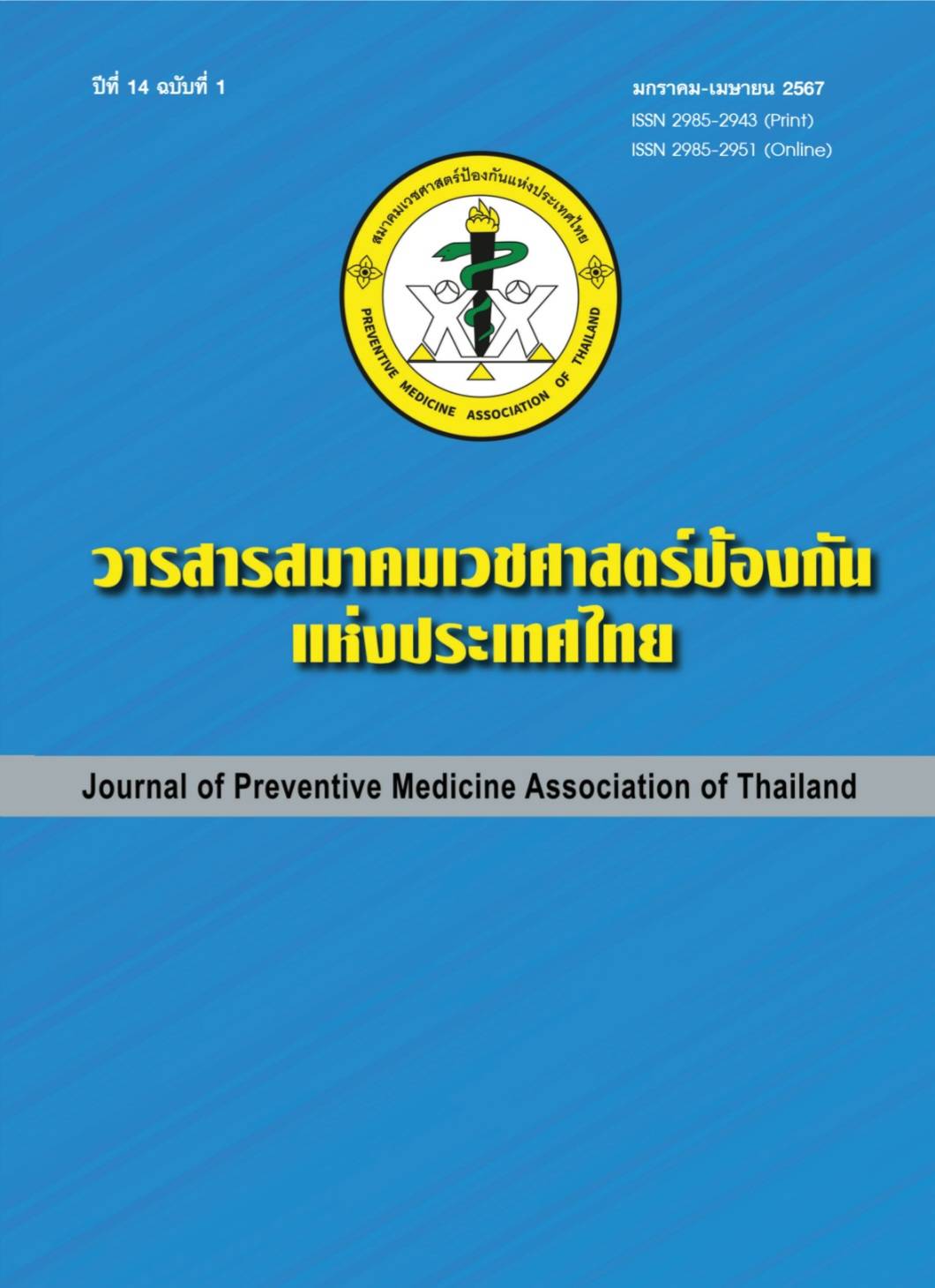Studying the Situation of Abortion Following the Enforcement of the Amendment to the Criminal Code (No. 28) B.E. 2564 (2021)
Keywords:
abortion, criminal code, knowledge, attitudes, ecological modelAbstract
Objective: To investigate the knowledge and attitudes towards Amendment (Act) No. 28 of the Criminal Code, as well as to explore the situation of policy execution and the operational aspects of abortion services following the enactment of this Amendment, B.E. 2564 (2021). Methods: This research was a descriptive study. The sample group included 29 executives and practitioners at the policy and local levels for qualitative data, and 521 individuals responsible for providing counseling and safe abortion services in public hospitals for quantitative data. Data were collected through interviews, questionnaires, and group discussions, and analyzed using content analysis for qualitative data and descriptive statistics for quantitative data. Results: The results revealed a deficiency in knowledge and understanding among practitioners regarding the substantive changes in the amended Act. A positive attitude towards the amendment facilitated a sense of comfort among practitioners in executing their duties lawfully and had a beneficial impact on service recipients, enabling access to legal abortion services for women with unplanned pregnancies. However, there were concerns about negative attitudes, fearing that the amendment might lead to decreased contraception use and promote premarital sexual activities. A qualitative analysis within an ecological framework highlighted several operational challenges in abortion services: 1) At the microsystems level, there was a lack of cooperation and personnel shortage among practitioners, as well as conflicts within families regarding the decision to abort; 2) At the mesosystems level, complexities in service procedures and inadequate service coverage across all locations were observed; 3) At the exosystems level, societal and community stigma towards abortion led to the concealment of such practices. These problems stemmed from personal beliefs viewing abortion as sinful; 4) At the macrosystems level, practitioners were found to be unaware of the guidelines for operating under the amended Act. Conclusion: There is a need to enhance knowledge and understanding of the Criminal Code Amendment (Act No. 28), B.E. 2564 among practitioners. Additionally, a change in societal mindset towards abortion, considering its socio-economic impacts, is crucial.
References
จรวยพร เหมรังษี. กฎหมายการทำแท้งกับจริยธรรมในสังคมไทย. วารสารสังคมศาสตร์และมานุษยวิทยาเชิงพุทธ 2564;6(11):483-98.
พระราชบัญญัติแก้ไขเพิ่มเติมประมวลกฎหมายอาญา (ฉบับที่ 28) พ.ศ. 2564. ราชกิจจานุเบกษา เล่มที่ 138, ตอนที่ 10 ก (ลงวันที่ 6 กุมภาพันธ์ 2564).
สำนักอนามัยการเจริญพันธุ์ กรมอนามัย. ที่มาของพระราชบัญญัติแก้ไขเพิ่มเติมประมวลกฎหมายอาญา (ฉบับที่ 28) พ.ศ.2564 การประชุมเพื่อผลักดันการดำเนินงานตามพระราชบัญญัติแก้ไขเพิ่มเติมประมวลกฎหมายอาญา (ฉบับที่ 28) พ.ศ. 2564. นนทบุรี: กรมอนามัย; 2564.
Bronfenbrenner U. The ecology of human development: experiments by nature and design. Cambridge, MA: Harvard University Press; 1979.
สมภาร ศิโล. การนำนโยบายสู่การปฏิบัติ. วารสารวิชาการศิลปะศาสตร์และวิทยาศาสตร์ 2558;2(1):1-9.
กมลทิพย์ แจ่มกระจ่าง. การรับรู้และการขับเคลื่อนพระราชบัญญัติการป้องกันและแก้ไขปัญหาการตั้งครรภ์ในวัยรุ่น พ.ศ. 2559. วารสารวิชาการสาธารณสุข 2562;28(2):189-201.
สุทธิรักษ์ นภาพันธ์, พูนชัย ปันธิยะ. ทัศนคติของสูติแพทย์ต่อการยุติการตั้งครรภ์ที่ปลอดภัย. วารสารการพยาบาล การสาธารณสุขและการศึกษา 2562;20(3):3-14.
ศูนย์ข้อมูลและข่าวสืบสวนเพื่อสิทธิพลเมือง. เครือข่ายอาสา RSA แถลงการณ์ข้อเท็จจริงเรื่องการทำแท้งในประเทศไทย [อินเทอร์เน็ต]. 2564 [เข้าถึงเมื่อ 17 เม.ย.2564]. เข้าถึงได้จาก: https://www.tcijthai.com/news/2021/1/current/11301
สำนักอนามัยการเจริญพันธุ์ กรมอนามัย. รายงานเฝ้าระวังการแท้งประเทศไทย พ.ศ. 2563. นนทบุรี : สำนักอนามัยการเจริญพันธุ์ กรมอนามัย; 2563.
เรณู ชูนิล, วรรณภา นาราเวช. โครงการวิจัยรูปแบบการจัดระบบบริการและการยอมรับการยุติการตั้งครรภ์โดยใช้ยาในประเทศไทย. วารสารการส่งเสริมสุขภาพและอนามัยสิ่งแวดล้อม 2559;39(1):35-43.
Jensarikorn P, Phlainoi S, Phlainoi N, Saejeng K. Accessibility to reproductive health rights among adolescents in three provinces of Thailand. Journal of Health Research 2019;33(1):35-42.
วรธา มงคลสืบสกุล. การเข้าถึงบริการทางสาธารณสุข: ภาพสะท้อนและความเหลื่อมล้ำของกลุ่มเปราะบางทางสังคม. วารสารมนุษยศาสตร์และสังคมศาสตร์ มหาวิทยาลัยเอเชียอาคเนย์ 2565;6(1):55-69.
พิมพ์ณิชณิณ ภิวงศ์กำจร. การพัฒนาแนวทางการป้องกันและแก้ไขปัญหาตั้งครรภ์ในวัยรุ่นโดยการมีส่วนร่วมของครอบครัวชุมชนและองค์กรในพื้นที่ตำบลกุมภวาปี อำเภอกุมภวาปี จังหวัดอุดรธานี. วารสารวิชาการสาธารณสุข 2563;29(4):608-17.
Olson RM, Kamurari S. Barriers to safe abortion access: uterine rupture as complication of unsafe abortion in a Ugandan girl. BMJ Case Rep 2017;bcr2017222360.
ปติมา หิริสัจจะ. การพัฒนารูปแบบกลไกดูแลช่วยเหลือวัยรุ่นที่ตั้งครรภ์ให้ได้รับสิทธิตามพระราชบัญญัติการป้องกันและแก้ไขปัญหาการตั้งครรภ์ในวัยรุ่น พ.ศ. 2559. วารสารการส่งเสริมสุขภาพและอนามัยสิ่งแวดล้อม 2566;45(1):27-38.
พระราชบัญญัติการป้องกันและแก้ไขปัญหาการตั้งครรภ์ในวัยรุ่น พ.ศ. 2559. ราชกิจจานุเบกษา เล่มที่ 133, ตอนที่ 30 ก (ลงวันที่ 30 มีนาคม 2559).
Downloads
Published
How to Cite
Issue
Section
License
Copyright (c) 2024 สมาคมเวชศาสตร์ป้องกันแห่งประเทศไทย

This work is licensed under a Creative Commons Attribution-NonCommercial-NoDerivatives 4.0 International License.
บทความที่ลงพิมพ์ในวารสารเวชศาสตร์ป้องกันแห่งประเทศไทย ถือเป็นผลงานวิชาการ งานวิจัย วิเคราะห์ วิจารณ์ เป็นความเห็นส่วนตัวของผู้นิพนธ์ กองบรรณาธิการไม่จำเป็นต้องเห็นด้วยเสมอไปและผู้นิพนธ์จะต้องรับผิดชอบต่อบทความของตนเอง






